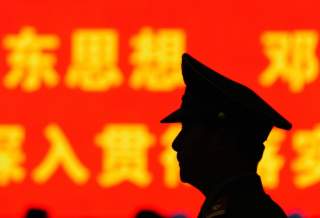Why Chinese Aggression Starts at Home
The main drivers of China’s foreign policy are found in Chinese domestic politics.
A final important domestic driver of the PRC’s foreign policy is the Chinese capacity to consider all Chinese actions to be defensive by definition, reflective of Chinese internalizing the notion—inherited and repeated by the CCP—that China is a fundamentally peace-loving, just and morally upright country that practices a “principled” foreign policy. As a consequence, it is easy for China to dismiss foreign complaints that Beijing’s behavior threatens them, and for Chinese officials to believe their own propaganda that Beijing’s actions are justifiable responses to intrusions and encroachments by foreign governments.
The CCP has stoked Chinese nationalism and triumphalism as means of re-establishing the Party’s legitimacy after market reforms led to an explosion of graft and exploitative capitalism involving Party officials. Nationalism among the mass public now limits the government’s diplomatic freedom of maneuver toward less confrontational policies. In track two discussions, for example, Chinese participants often say Beijing cannot walk back the “9-dashed line” because they fear a backlash from the Chinese public, which would see this as a concession to foreigners. In effect, then, Beijing is demanding that other regional governments pay the costs of a domestic political predicament that the Chinese government has created for itself.
Recognizing the domestic sources of Chinese foreign policy is not a reason for the United States and its allies to shrink from opposing illegitimate moves by Beijing. It is possible the Chinese leadership might welcome or even seek out a foreign military confrontation as a means of diverting the attention of the Chinese public from a governance failure at home. It is at least as likely, however, that Chinese leaders will hesitate to plunge their country into a crisis that would lead to economic hardship and subsequent social unrest. Most of the Asia-Pacific governments—and most of the region’s military strength, if the United States is included—still stand on the side that sees North Korea as a dangerous pariah and favors settlement of territorial disputes through peaceful and non-coercive negotiations.
Denny Roy is a senior fellow at the East-West Center, Honolulu. His most recent book is Return of the Dragon: Rising China and Regional Security (Columbia University Press, 2013).
Image: Guard in Tiananmen Square. Flickr/Johnathan Nightingale

